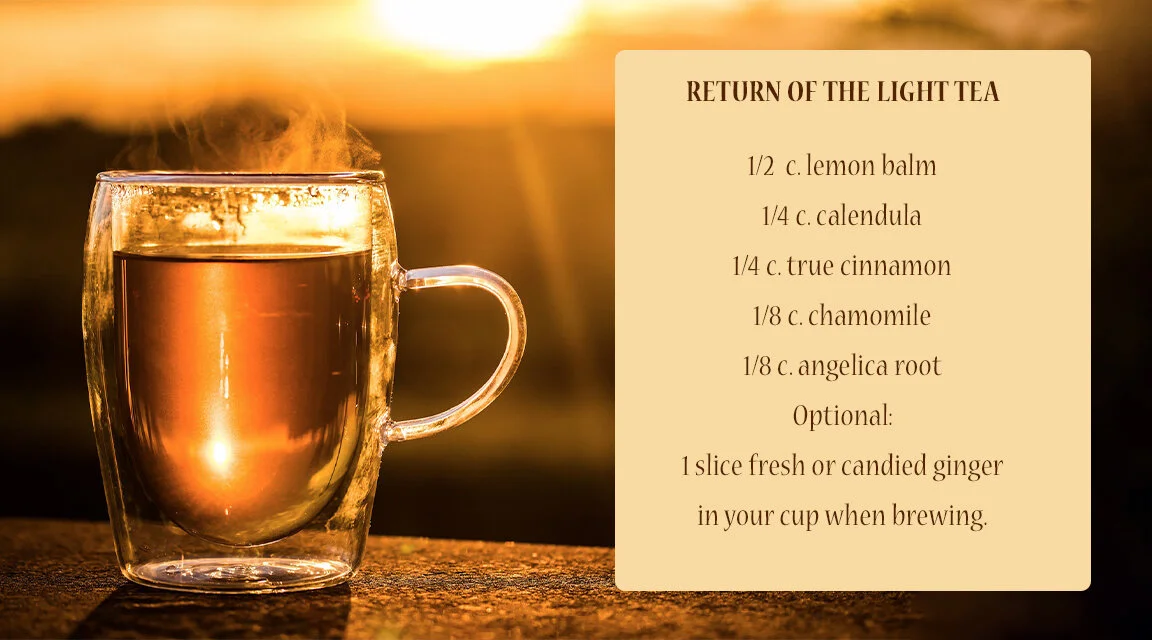We’ve tipped over that point of maximum darkness and now, though the days are still short and the night still comes awfully early, I can feel the light returning. I feel it like a tingle in my fingertips and a warm feeling in my solar plexus. I feel hope returning and I see positive signs, both mundane and magical.
I was working in the shop on the evening of this most recent full moon in Cancer, and I stepped outside into the cool night to take a break. As I was standing in the backyard, a small bird suddenly flew onto the fence. I was surprised because the timing was unusual, it being night and all. As I peered into the shadows to confirm what I thought I saw, the little bird peered back at me and for some reason I wondered, “Is this bird going to fly over to me?” It’s not something birds generally do, but I wondered it all the same. And then it DID fly over to me and landed on my shoulder! I could hardly believe it! It spent several minutes walking around on my shoulders, seemingly uninterested in leaving.
I was dying to tell my colleagues in the store but I didn’t want to shout or call out because I thought it would probably break the spell and scare the bird away, so I carefully went back inside with the bird on my shoulder and called softly to my coworkers to witness this delightful magic. It flew off my shoulder at that point (of course) and settled on top of the kitchen cabinets for a few minutes until I could retrieve it and put it back outside. We couldn’t get a decent picture of it, but I got a good look while it was on my shoulder and then I figured out what it was afterward: a kind of finch called a Pine Siskin.
The whole experience was enchanting and felt like a beacon of hope!
In honor of the returning light and the hope that rises with every dawn, I offer you this sunshiny tea.
~ Jenny
(Photo: Myriams-Fotos on Pixabay)
½ c. Lemon Balm
¼ c. Calendula
¼ c. Sweet, or “True” Cinnamon (if using cassia cinnamon, reduce to ⅛ c.)
⅛ c. Chamomile
⅛ c. Angelica Root
*optional: 1 slice fresh or candied ginger in your cup when brewing
Use 1 Tbs of tea per cup; steep covered for at least 10 minutes.
Sweeten to taste.
Here are some details about each of the herbs used:
Angelica (Angelica archangelica):
Valued for its spicy, aromatic flavor, Angelica has been used as a flavoring agent for candy and alcohol for hundreds of years. Medicinally it is strengthening to the body overall; good for the lungs, digestion, immune system, and to reduce inflammation. According to M. Grieve, “Gerard*, among its many virtues that he extols, says 'it cureth the bitings of mad dogs and all other venomous beasts.'
*John Gerard, c. 1545–1612, English Botanist
Calendula (Calendula officinalis):
Used for centuries internally and externally for wound healing, immune and digestive support, and to lift the spirits. High in carotenoids, like flavoxanthin and auroxanthin. Nicholas Culpepper wrote, “The flowers, either green or dried, are much used in possets, broths, and drink, as a comforter of the heart and spirits, and to expel any malignant or pestilential quality which might annoy them.”
NOTE - Do not use while pregnant. Rarely people with a daisy allergy may have a cross-reaction.
Cinnamon (Cinnamomum verum):
Native to Ceylon, used in Egypt for embalming. Stimulant, can raise energy to a high spiritual vibration as well as . Magically it is said to increase good fortune and is used for love spells. Antioxidant, anti-inflammatory, warming. Can lower blood sugar, balance cholesterol levels, and lower blood pressure.
German Chamomile (Matricaria recutita):
Also known as Wild Chamomile, Corn Feverfew, and Scented Mayweed (archaic). A classic remedy for anxiety, insomnia, and nervous disorders of all kinds. Anti-inflammatory and antispasmodic, it’s soothing to the entire body. Eases tense muscles, and menstrual and gastrointestinal cramps, as well as skin inflammation.
NOTE - People with a daisy allergy may have a cross-reaction.
Ginger (Zingiber officinale):
Antiemetic, improves circulation and digestion, eases congestion, antimicrobial, antitussive, analgesic, warming to the extremities, expectorant, antihistaminic. May also protect nerve cells in the brain and provide protection against Alzheimer’s disease; may lower cholesterol and prevent platelet aggregation and arterial plaque build-up. One of the world’s most popular culinary flavorings.
NOTE - Avoid large doses during pregnancy.
Lemon Balm (Melissa officinalis):
Also known as Sweet Melissa. Has been considered something of a cure-all for centuries: used to treat wounds, prevent cold sores, soothe nerves, promote sleep, ease depression, stimulate appetite and digestion, and strengthen memory. Sedative and antispasmodic. Culpeper said it should “be kept in every gentlewomans house...It causeth the Mind and Heart to become merry...and driveth away troublesome cares.”
May this tea bring a golden glow to your heart!
by Jenny


